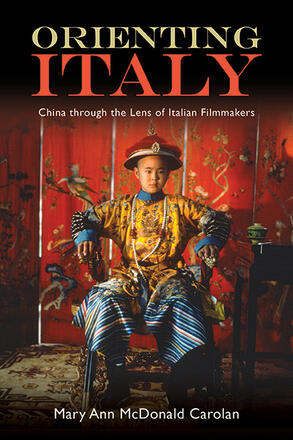
Orienting Italy
China through the Lens of Italian Filmmakers
Alternative formats available from:
Explores Italian filmmakers' representations of China and the Chinese, both at home and abroad.
Description
Winner of the 2022 Book Award for Performance and Visual Culture presented by the American Association of Teachers of Italian
Orienting Italy explores contemporary Italian filmmakers' fascination with China and the Chinese in both documentary and fictional films. Delineating the contours of this fascination, the book begins with the works of Carlo Lizzani (Behind the Great Wall, 1958) and Michelangelo Antonioni (Chung Kuo—China, 1972), both of whom ventured to China with the aim of documenting new, yet physically and culturally distant, realities. Their documentary investigations yielded to fictional portrayals, from the lavish view of a historical Middle Kingdom by director Bernardo Bertolucci (The Last Emperor, 1987) to the stark consideration of Italian economic exchange with contemporary China by Gianni Amelio (The Missing Star, 2006). The wave of Chinese migration to Italy in the late twentieth century created a new sense of otherness within Italy as Chinese migrants became the subjects of fictional narratives and documentaries in the works of Stefano Incerti (Gorbaciof, 2010) and Andrea Segre (Shun Li and the Poet, 2011) and Riccardo Cremona and Vincenzo De Cecco (Miss Little China, 2009). In the twenty-first century, a new chapter in the relationship between Italy and China has emerged in the form of transnational collaborations in the art and business of filmmaking.
Mary Ann McDonald Carolan is Professor of Italian and Director of the Italian Studies program at Fairfield University. She is the author of The Transatlantic Gaze: Italian Cinema, American Film, also published by SUNY Press.
Reviews
"Orienting Italy presents a highly innovative approach to the subject by adopting Rey Chow's focus on exploring areas of intersections between the Chinese informant and the Italian foreign observer, thus expanding current scholarship … Orienting Italy is an important contribution that will appeal to scholars in the expanding field of transnational Italian studies." — Journal of Italian Cinema & Media Studies
"In Orienting Italy Mary Ann Carolan has achieved a difficult task in the humanistic and interdisciplinary scholarship on Italy and China. She has provided an eminently readable and yet well-contextualized text on major Italian films about mainland Chinese and Chinese in diaspora. This is the first book in any language that offers an at once panoramic and close-up view of Italian cinematic representations of China from the late 1950s to the early 2010s. Carolan considers both documentary and fiction films, and both widely-viewed major productions and little-known gems, carefully explaining the filmmakers' diverse experiences with China. This is a must-read for anyone with an interest in understanding the Italian tradition of screening China and Chinese people over the past few decades." — Gaoheng Zhang, University of British Columbia
"Orienting Italy provides a concise introduction to films made by Italian directors about China as well as about the Chinese in Italy, focusing primarily on films made after the establishment of the People's Republic of China in 1949 and including key films from the twenty-first century. Only recently have scholars turned their attention to the depiction of China in European cinema, particularly French cinema. More needs to be done on the rich cinematic history that links other European nations, such as Italy, to China, and this book helps to fill that gap." — Gina Marchetti, author of Citing China: Politics, Postmodernism, and World Cinema